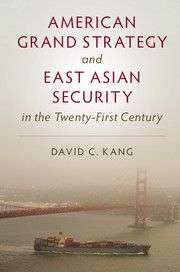Crossref Citations
This Book has been
cited by the following publications. This list is generated based on data provided by Crossref.
Pempel, T. J.
2019.
Japan and Asia’s Contested Order.
p.
39.
Marks, Stephen V.
and
Yau, Cheryl Jia Min
2019.
Southeast Asia and the ASEAN Economic Community.
p.
381.
Han, Zhaoying
Cook, Richard J.
and
Ohle, Maximilian
2019.
The Thucydides Trap and the Korean Peninsula: So why Won’t the USA and China Get Caught?.
Journal of Chinese Political Science,
Vol. 24,
Issue. 1,
p.
105.
He, Kai
2019.
Constructing dynamic security governance: institutional peace through multilateralism in the Asia Pacific.
Journal of Contemporary East Asia Studies,
Vol. 8,
Issue. 2,
p.
141.
PEMPEL, T. J.
2020.
Asia’s Lesser Powers Confront US–China Threat to the Regional Order.
Issues & Studies,
Vol. 56,
Issue. 02,
p.
2040005.
Matsuda, Takuya
2020.
Explaining Japan’s post-Cold War security policy trajectory: maritime realism.
Australian Journal of International Affairs,
Vol. 74,
Issue. 6,
p.
687.
Heydarian, Richard Javad
2020.
The Indo-Pacific: Trump, China, and the New Struggle for Global Mastery.
p.
201.
Heydarian, Richard Javad
2020.
The Indo-Pacific: Trump, China, and the New Struggle for Global Mastery.
p.
263.
Cook, Richard J.
Ohle, Maximilian
and
Han, Zhaoying
2021.
Bargaining interactions reconsidered: the Korean Peninsula nuclear crisis viewed through the lens of hierarchy.
The Pacific Review,
Vol. 34,
Issue. 1,
p.
113.
Ettinger, Aaron
2021.
After Failure: American Foreign Policy at the End of the Post–Cold War Era.
International Studies Review,
Vol. 23,
Issue. 1,
p.
248.
Li, Xiaoting
2021.
Saving National IR from Exceptionalism: The Dialogic Spirit and Self-Reflection in Chinese IR Theory.
International Studies Review,
Vol. 23,
Issue. 4,
p.
1399.
Beeson, Mark
and
Biscop, Sven
2021.
The European Union’s Security Relations with Asian Partners.
p.
29.
Dian, Matteo
2022.
The rise of China between Global IR and area studies: an agenda for cooperation.
Italian Political Science Review/Rivista Italiana di Scienza Politica,
Vol. 52,
Issue. 2,
p.
252.
Yang, Gongyan
Tang, Tingfeng
Wang, Beibei
and
Qi, Zhen
2022.
Money talks?: an analysis of the international political effect of the Chinese overseas investment boom.
Review of International Political Economy,
Vol. 29,
Issue. 1,
p.
202.
Solar, Carlos
2022.
Thinking beyond averages: Quantile regression modelling and military expenditure.
Bulletin of Sociological Methodology/Bulletin de Méthodologie Sociologique,
Vol. 155,
Issue. 1,
p.
82.
Dian, Matteo
2023.
International Relations and Area Studies.
p.
17.





